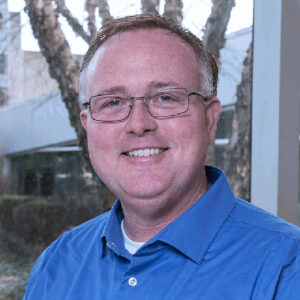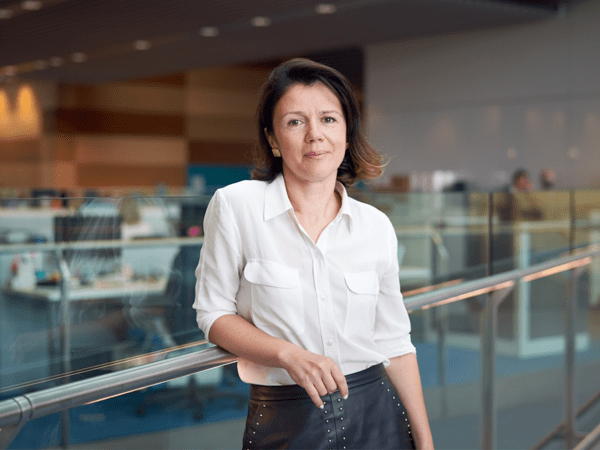When you hear the words “world famous scientist,” “devoted parent and husband,” “enthusiastic mentor,” and “committed friend,” who comes to mind? I, like many others across the world, think of Dr. C. David Allis. David, a prolific scientist, with over 400 publications and more than 100,000 citations, made many discoveries that have shaped our understanding about how genes are regulated and made a full circle bench-to-bedside impact.


He spent his career addressing concepts that resulted in new principles and understanding in areas that desperately needed answers. The numerous trainees he mentored are now leading laboratories at the most prestigious universities and medical schools across the world, and they too are making breakthroughs and flourishing as mentors, just as he taught them. At this time, I am privileged to join many throughout the globe who are remembering, thanking, and honoring him.
Born on March 22, 1951, in Cincinnati, Ohio, David graduated from the University of Cincinnati (1969) and received his Master’s degree (1975) and PhD (1978) from Indiana University. David married Barbara in 1975 and together they raised three children, Laura, Michael, and Brian, and now have two grandchildren, Hannah and Sam.
He launched his academic career at Baylor College of Medicine as an assistant professor in 1981, after completing his postdoctoral fellowship at the University of Rochester. In 1990, he moved his laboratory to Syracuse University. David relocated to the University of Rochester in 1995 where he was the Marie and Joseph Wilson Professor of Biology and Oncology and then on to become the Harry F. Byrd, Jr. Professor of Biochemistry and Molecular Genetics, Professor of Microbiology and Member of the Center for Cell Signaling, University of Virginia Health System (1998).
In 2003, David ultimately joined The Rockefeller University in New York, NY. Here, he was the Joy and Jack Fishman Professor and Head of the Laboratory of Chromatin Biology and Epigenetics.
David’s scientific career resulted in numerous discoveries that impacted our understanding about how DNA is packaged and regulated allowing gene expression and other DNA-dependent processes to occur. DNA is wrapped around proteins called histones, which make a structure called chromatin. Proper modulation of the DNA packaging and gene regulation is key for cell function, fate, and development, and chemical modifications to histones or DNA itself contribute to this control. The mis-regulation of these modifications can result in developmental issues and diseases such as cancer.
Normal cell function relies on the ability to properly regulate modification states at the appropriate times and under the correct conditions, allowing the cell to understand its role and respond accordingly.
Properly regulating these chemical changes is similar to the proper punctuation of a sentence. For example, “Let’s eat, grandma!” has a different meaning than “Let’s eat grandma!” While the words are the same (DNA), the comma changes context and conclusion (chemical modifications). The area of research investigating the proper inheritance and maintenance of DNA information, without changing its sequence, is called epigenetics.
David pioneered chromatin biology and epigenetics his entire career. His passion and commitment to understanding histones and their impact on gene expression speaks to his enthusiasm and persistence that has shaped these fields.
David studied histones and their chemical modifications before they were en vogue. He knew that histones were more than spools for DNA to be wrapped around and that they likely had a function.
He leveraged a range of cellular models over the years to answer these questions. In fact, he initially used the single-celled ciliate Tetrahymena to open the door to ultimately understanding gene regulation in human cells. While the model system and target proteins were less interesting to the masses when he started, his persistence paid off and made an impact that many are following today.
David also recognized the potential of using modification-specific antibodies as a means to detect the location of modified histones in cells, in order to better understand the underlying mechanisms.
His discoveries are too numerous to mention here, but a couple of his monumental highlights are: 1) the 1996 identification of the histone acetyltransferase (HAT) that modified histones and impacted gene expression; and 2) the 2013 demonstration that histone mutations (referred to as onco-histones) in cancer are able to impact gene expression and drive disease.
The seminal discovery about the HAT paved the way for many other enzymes that chemically modify histones to be elucidated. He noted in a 2006 profile article in The Proceedings in the National Academy of Sciences that the initial studies made “people think about a more active process in which chromatin truly participates.”


David has been known to say “every amino acid matters” since they could be chemically modified, impacting chromatin regulation and, in turn, the cell. The demonstration that histones are mutated in cancer and have a consequence also elevated the importance of histones. They went from being a passenger in the process to a direct contributor.
These highlighted seminal observations are a series of chapters in a long novel of discoveries that David has made, but illustrate his great impact. His discoveries resulted in his election to the National Academy of Sciences, the National Academy of Medicine, and the American Academy of Arts and Sciences to name a few. He was also awarded many of the most prestigious research prizes to honor his contributions: the Canada Gairdner International award (2007), the Lewis S. Rosenstiel Award (2011), the Japan Prize for Life Sciences (2014), the Breakthrough Prize in Life Sciences (2015) and the Albert Lasker Basic Medical Research Award (2018). It is easy to take a step back and see that David left a legacy most scientists dream of, but I, and many others, think there is another gift he gave the world that goes beyond science.
David was the quintessential mentor. It meant so much to David that he even wrote an opinion piece on being an advisor in The Proceedings of the National Academy of Sciences in 2017, which I highly recommend reading. He did not just hire people and send them off to tackle problems that impact our scientific understanding, but David stood with them and cared about their careers.
David himself noted that “students and postdocs need more than just a ‘good letter’,” but rather we need to be their advocate and invest in their success. This fact about David was evident through numerous posts on social media when the world realized that he had passed.
The most inspiring part about David was his enthusiasm and love of science and how he used this to guide and help people, which was true for those in his laboratory and those who were not, including myself.
I remember when David and I met for the first time in 2003, shortly after I became a postdoctoral fellow at Harvard Medical School. He was giving a seminar and was surrounded by people after his talk concluded. Even with all the excitement around him, David noted my interest in chatting with him. We walked together to the next stop on his agenda, and I introduced myself and asked him many questions. It was my first glimpse into his personality and interest in trainees.
His willingness to engage me was the same every time I encountered him after that first meeting, and continued over nearly 20 years. His support grew over the years for my science, career, and personal life. He shared with me his feelings on how our family and kids matter most. In fact, I noted to him in many exchanges that I appreciated his love of family, which was one of the things I admired most about him.
He provided guidance and thoughts on career decisions and wrote support letters for which I was no exception. David ultimately joined the advisory board for the Cancer Epigenetics Institute that I launched, and served as director of, at Fox Chase Cancer Center. In addition to the invaluable scientific input, he provided me with many words of encouragement like, “Don’t change a thing… It’s working! Good job!”
Most of all, I appreciated his friendship and care. David did this for those that were in his life. While grieving his passing, I am feeling privileged to have had him as a role model, providing input to help me stay the course. My story is not unique, but reflects that David cared about scientists, trainees, and those he encountered, not just those that he nurtured in his own laboratory.


Source: Fox Chase Cancer Center
David left a legacy that we should all aspire to leave behind—an “epigenetic imprint” on those he met, trained, and encountered by assisting others as a mentor and friend. We should strive to follow his lead and leave our own personal epigenetic imprint on those in our lives, so that our mark on the world will be felt for generations beyond our own as his most certainly will be.
I would like to thank various former Allis’ trainees for encouraging me to write this tribute, providing feedback, and most importantly, for providing me quotes that capture David and his impact on their lives:
“I have never met ANYONE who loved science more than Dave. His unfiltered joy for new discoveries was as contagious as it was inspiring.” Sharon Dent, PhD, Professor and Chair, MD Anderson Cancer Center
“Dave was also always encouraging and enthusiastic, through thick and thin. I will be forever thankful for his mentorship and guidance, for his friendship and unwavering support.” Brian Strahl, PhD, Professor and Chair, University of North Carolina
David left a legacy that we should all aspire to leave behind—an “epigenetic imprint” on those he met, trained, and encountered by assisting others as a mentor and friend.
“Since the very first time I met Dave Allis at my postdoc interview, I have cherished his infectious enthusiasm for science and discovery. Even when experiments proved challenging, or I was trying to find my niche in the chromatin world, Dave always believed in me. I am forever grateful for this gift.” Emily Bernstein, PhD, Professor and Program Co-leader, Icahn School of Medicine at Mount Sinai
“Dave’s office was adorned with photographs and mementos from his laboratory colleagues, showcasing his passion for science and the people he worked with. He jokingly referred to himself as the “biggest cheerleader” for his positive attitude and encouragement of others. David was not only a supportive mentor, but also a true leader who motivated those around him through his unwavering dedication and commitment to their success.” Peter Lewis, Associate Professor, PhD, University of Wisconsin, Madison
“He was unfailingly humble, never ceased to be an incredibly supportive mentor, and he was always just as excited to hear about your family as your new findings in the lab. He would do anything to help those of us who were lucky enough to train with him and we will miss him very much.” Erica Korb, PhD, Assistant Professor, Perelman School of Medicine, University of Pennsylvania
Dr. C. David Allis may have departed us on Jan. 8, 2023, but he has left with us a lasting imprint on discovery, science, and most importantly, the people whom he trained and mentored. His impact on science and people will live on for many generations.
For this, I say, “Thank you, Dave, you are missed, but the world was left far better through your gift of friendship, mentorship, and scientific discovery.”
Consistent with David’s love of fostering the next generation, his family established The C. David Allis Mentorship Fund for Young Scientists at The Rockefeller University. This fund will honor Dr. David Allis’s legacy as a prolific scientist and as a devoted advisor/mentor to numerous trainees. Furthermore, the Cancer Epigenetics Institute annual travel awards for trainees at Fox Chase Cancer Center will be given in his honor.
The author is:
Johnathan Whetstine, PhD
Director, Cancer Epigenetics Institute,
Program leader, Cancer Signaling and Epigenetics Program,
Jack Schultz Chair in Basic Science,
Fox Chase Cancer Center







